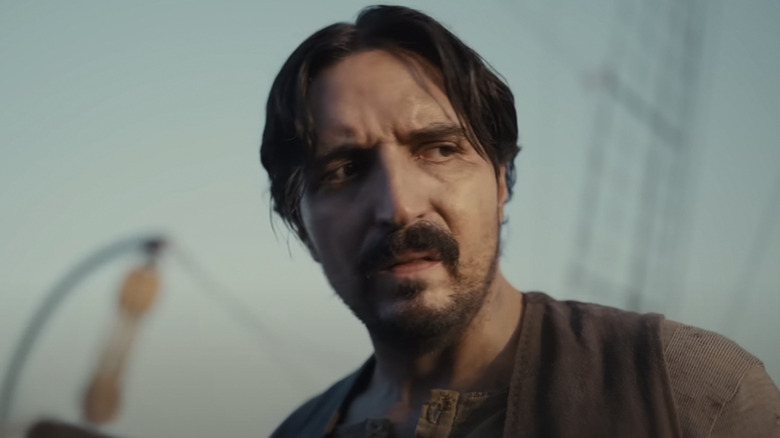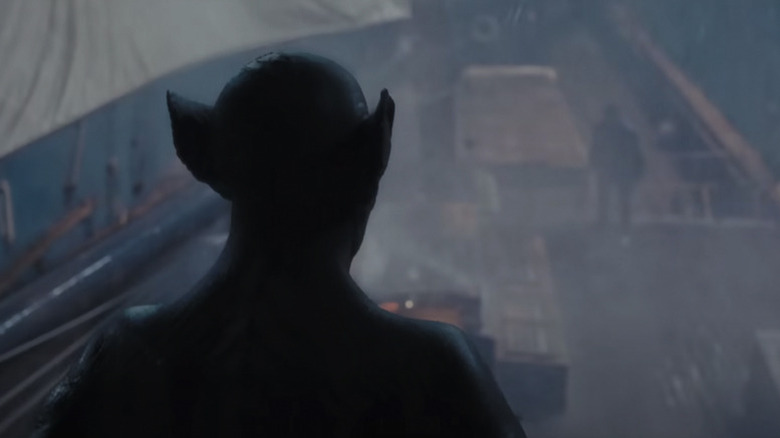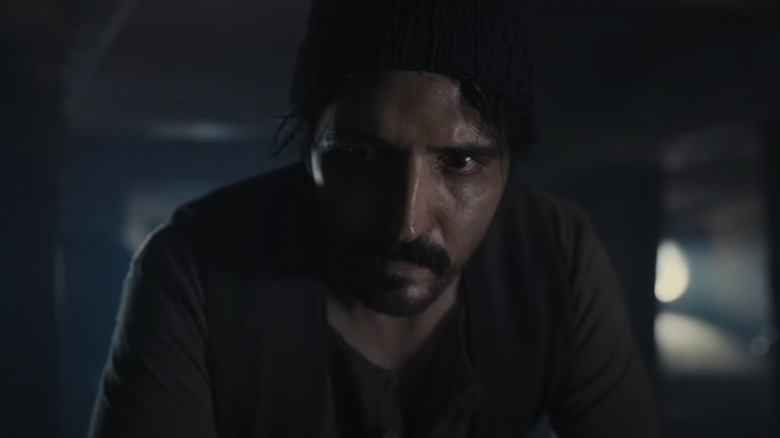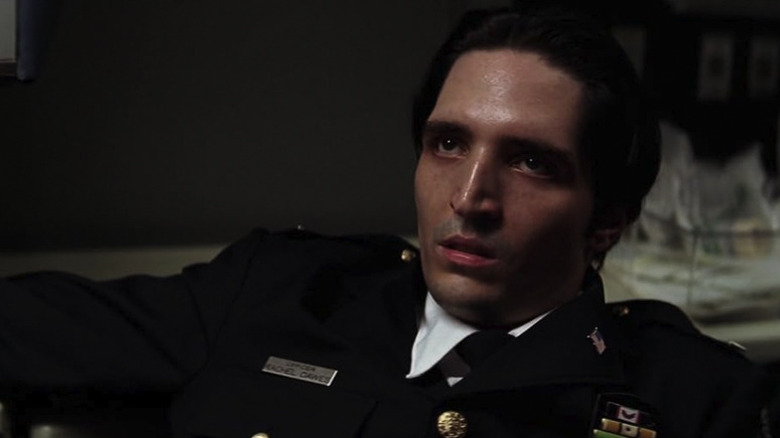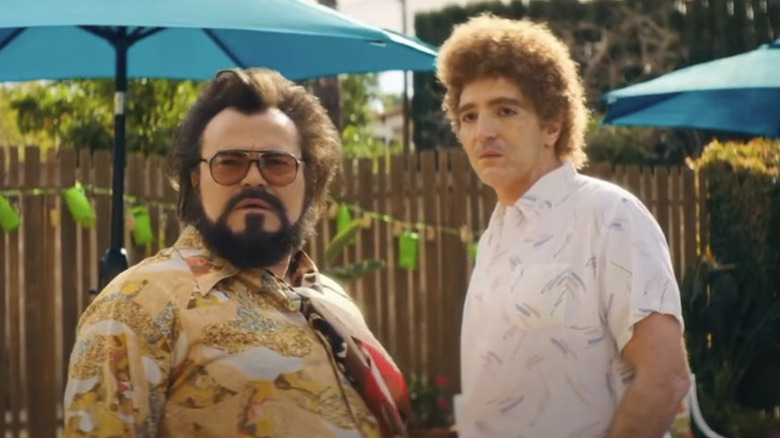The Last Voyage Of The Demeter Continues David Dastmalchian's Biggest Year Yet [Exclusive Interview]
If you've been paying attention to the genre space, you know that 2023 is a gigantic year for David Dastmalchian. The prolific character actor has already worked on "Ant-Man and the Wasp: Quantumania," "Boston Strangler," "The Boogeyman," and "Oppenheimer," and our fingers are crossed that "Late Night with the Devil," a banger that debuted at this year's SXSW Film Festival, will also get a release before the year is over. But that's not all: Dastmalchian also plays a major role in "The Last Voyage of the Demeter," a spooky vampire story taken from a chapter of Bram Stoker's "Dracula" and plays out largely on what Ron Burgundy might call "an old, old wooden ship."
Dastmalchian plays Wojchek, the stoic first mate to Liam Cunningham's steadfast captain. When they set sail for London, they soon make the horrifying discovery that the crew is being attacked when night falls. With paranoia horror films like John Carpenter's "The Thing" serving as obvious forebears, director André Øvredal ("Troll Hunter," "The Autopsy of Jane Doe") slowly ramps up the tension as the crew begins to turn on each other until they realize the real truth of what's happening: Dracula himself has stowed away in a wooden box belowdecks and is emerging at night to feed on the sailors.
As Dastmalchian tells it, this is a story he's long wanted to be a part of. Back in late June, well before the SAG-AFTRA strike, I spoke with him about the physicality of his role, his aspirations to play a Bond villain, thoughts about being labeled a "horror guy" in 2023, and experiences from the sets of films as varied as "The Dark Knight" and "Weird: The Al Yankovic Story."
Note: This interview has been lightly edited for clarity and brevity.
'There's got to be at least one vampire for me'
You are no stranger to doing accents on screen. Tell me about crafting the accent for your character in "The Last Voyage of the Demeter."
So I've been a fan of the book "Dracula" since I was young, first time I read it, and I was always obsessed with the chapter about the captain's log and the journey of the Demeter. And I always wanted to be a part of bringing that story to some form of cinematic life. I thought, "I will adapt a screenplay of this." As I started talking about it, at one point somebody said, "You know, that film's being made." Then I found out that it was being made through Universal with Amblin and André Øvredal was making it. So I reached out and I thought, "Please, how can I be a part of this movie?" I wrote him an impassioned letter, and I contacted the casting director, Nina Gold. They said, "There's really nothing in it for you." I thought, "There's got to be at least one vampire for me." And they said, "No, there's not."
Then they came back a few weeks later and said, "Well, there's this one character, he's the first mate of the ship. His name's Wojchek." Wojchek, by the way, is the name of one of my favorite plays by Georg Büchner. But anyway, I said, "It's a sign. I'll go for it." And I read the sides that they sent me, which were pretty extensive. And this character looked, moved, lived, behaved so differently from anything that I'd ever gotten the chance to bring to life before that I saw it as this amazing challenge. I reached out through a friend of mine, who's a polyglot and a linguist who lives in Berlin, to say, "Do you know anybody, any native Polish speakers who can help me with my dialect?" He connected me with this amazing linguist who's also an artist named Marcel, who lives in Krakow, Poland. We met by Zoom.
They helped me with my audition, which was quite extensive. I put together a lot of tape of me and the character and existing on the boat and trying to make this rental house. I mean, I made my own little backdrop and everything. I went crazy for this role. And when I got the part, I contacted Marcel and I said, "All right," and I started working. I started doing Rosetta Stone to learn Polish. And I worked on the dialect and the delivery. And I hope that people who watch the film feel that it seems like an authentic Polish speaker from 1897 who's a sailor.
'I didn't exactly have the shiniest set of molars'
Tell me a little about the look of your character — the facial hair, the costume. What kind of input did you have into those aspects?
Everyone was so collaborative on the film, and it was such an amazing team of artists from all over the world. I mean, Heike [Merker], who's the makeup department head, had really great, strong vision for the look of these sailors. I had some incredible teeth that were made for me because, as you know, back then, dental hygiene was probably not tantamount. So I didn't exactly have the shiniest set of molars. [He inserts a fake set of teeth to illustrate his point, then removes them.] And then Carlo [Poggioli], the costumer from Italy, genius, has made so many amazing, incredible looks for theater and film, had just stellar vision. And my particular makeup artist, Aisha King, on the film, was so passionate about this character and finding the way that the wear and tear of daily life on the boat would affect him, as well as the battles with Dracula. There was a whole army helping to shape that.
Now, for my body and the way that I moved and existed in space, I took into account the way that he grew up, life on a boat, the rigorous demands of being a sailor in the 1800s. And so I found a physicality that required me to gain some weight, muscle mass, tried to work out a lot and build up my body, and just everything changed. The way that I sat, moved, talked, the way your head turns when you're shifting your attention, all of that stuff. It's like learning a whole new way to be a human being when it's something that's so far removed from your normalcy. A lot of times as actors, maybe you're playing a character that's a click away, two clicks away, or three clicks. Maybe it's a voice inflection, maybe it's a little bit of dialect, maybe it's some physical thing that you're bringing to life. But Wojchek was the entire spectrum of the challenge, and it was really hard.
Did you have one takeaway that you learned from watching André direct this movie?
Yeah. André's dedication to the genre meant that he was unabashed and unafraid of looking to his sources of inspiration, and filtering those into the story that he wanted to bring to life. So seeing how he consciously would look at films like "Jaws" and look at shots and perspective and camera-to-actor relationships and literally bring that visual language directly into the way that he was making this film and trying to do his own thing with it, I thought that was really cool. And maybe I've done it in an unconscious way, because I know I've looked at a lot of different forms of inspiration when I'm preparing a role or going to make a movie. But the way he dialogued about it and brought everybody else into the conversation I thought was really cool.
'That just affected me in this deep way, seeing an artist at that level operate in such a manner'
Speaking of learning things, you've spoken in the past about how you watched Heath Ledger slip in and out of character between takes on "The Dark Knight" and how that sort of disabused you of this romanticized idea of actors making things all about them so they can get to this extreme place to deliver a certain type of performance. If you could think back to your experience shooting that movie, I would love for you to tell me if you had any other behind the scenes observations that you noticed while working on that film, if anything else stuck out to you.
For me, the thing that stood out was getting the opportunity to observe one of the great masters of cinema, Christopher Nolan, be able to orchestrate a set with thousands of performers and hundreds if not thousands of crew members and extensive equipment setups under the incredible pressure of having to shoot in a downtown, thriving, operating metropolis like Chicago and make that Gotham City. Seeing him do so with nothing but confidence and clarity and the skill of a great leader and communicator. That just affected me in this deep way, seeing an artist at that level operate in such a manner, and since then, has been the bellwether representation of the captains that I love to embark on journeys with, the people who I will follow into the craziest waters, the most unknown places, the most dark chasms to jump with leaps of faith because somebody just has that kind of discipline and heart for cinema. And I saw it again. I got to see it on the set of his newest film. I can't wait for people to see.
I'm very excited about that. You told /Film in a previous interview that one of your career aspirations is to play a villain in a Bond movie. I was curious if you've ever had the opportunity to actually have any conversations with the folks at Eon about possibly doing that.
It begins right now. So whoever is reading this, take it as a sign. You were meant to be reading this line at this moment as you're thinking about the future of what you guys are doing with the franchise. Trust me when I say that I can bring something to an enemy of 007, whether he or she or they be played in a way that no one has ever seen Bond brought to life before, which is of course the way that you guys always do it. I think there's no one to push Bond to the limits of their capabilities the way that I could, and I would love to do it. So there's my pitch to them. I can't wait for them to read this. And then I will owe you when or if I ever get that role, I guess 10%.
Fantastic. So a lot of people, including us, have noticed that you have officially sort of become a horror guy in 2023, and "The Last Voyage of the Demeter" is the latest example of that. What do you think about that label?
I love it. I love it. I think genre is such a beautiful and special place for us to explore all the magic that cinema has at its capabilities while wrestling with really intense, big questions, and yet, your audience, because they're so caught up in the emotional journey of the movie, they're not even conscious sometimes of the ways in which you can get in and touch people's hearts and rip out their guts. I think it's so important to reach hearts and minds through storytelling. And I think we're at a time in history where bigotry and racism and homophobia and things that are just so hard to wrap our minds around are still permeating the day-to-day lives of so many people. I mean, if anybody thinks that misogyny is a thing of the past, they need to wake up and open their eyes.
We have a lot of people living under a lot of threat. It's a scary time right now. And with the power of genre, you can wrestle with big ideas and open people's hearts to the importance of looking out for one another and being there for one another, and why we're all connected, and how much we need to start getting over our bulls*** and being there for each other. And you could do all that and no one even needs to — you're not hitting anyone over the head with a mallet of messaging, because it's just in the nature of these kinds of stories. It reminds us how much we're all the same. No matter how much you think people may look differently than you or may express themselves differently than you, they deserve the same rights and treatment and love as you. We all do. And in the genre space, we can do that. I will never be an actor who raises their nose or poo-poos the power of genre. Do I love doing independent drama and working with auteur filmmakers in that space, the Michel Francos of the world? Yes, and I love going into that place. And I love making movies like my microbudget indies and off the grid films like "Animals" or "All Creatures Here Below," or I love period pieces and dramas. I love all forms of storytelling and cinema. But horror and genre, it's like, man, what a powerful medium. And science fiction, as well.
'Jack Black gave me a big hug and a high five'
Well said. I really enjoyed "Weird: The Al Yankovic Story" story, and you show up in that star-studded pool scene, which seemed to have a different comedic powerhouse popping up every single second. I have to imagine that the stories on that set were legendary. Do you remember the funniest thing that happened between setups on that day?
Oh, man. Watching Paul Tompkins practice his Gallagher smashing watermelons was pretty fun. But if you can imagine being an actor not known for being funny, who isn't particularly funny, who is a character actor that has brought to life maybe some pretty oddball characters, but definitely not in the comedic space, walking through a set where I'm going past Emo Philips as Salvador Dalí and Conan O'Brien as Andy Warhol and Jack Black as Wolfman Jack, and you've got the Lonely Island guys there and Paul F. Tompkins. And it seemed like every funny person in the world is in this poolside set. I mean, Nina West is there as Divine. It was out of control. Rainn Wilson there as Dr. Demento. And I had the punchline, for better or for worse. For lack of a better term, it seemed like that scene kind of was like ... And I was like, "Al, why did you ask...?"
I was so baffled that Al, because I'm friends with Al and he had asked me if I would do this part. When I got there and realized what was going on, I crapped my pants, man. I was like, you've got to land the joke. I've got to land a joke. And I'm surrounded by people who professionally land jokes every five minutes and are really good at it. So I guess, to me, it was the first time we really buttoned that scene and they yelled "cut" and Jack Black gave me a big hug and a high five and thought it was funny. That's my story, that's my takeaway. I'll tell that to the grandkids and whoever else wants to listen to me yak about my career someday and be like, "They thought I was all right." You know? Made people laugh.
That's amazing. So I assume you had some baseline level of expectation about what this production, "The Last Voyage of the Demeter," was going to be like in the days leading up to it. Now that you're on the other side of it, was there one thing that surprised you the most about working on the movie?
I was in the midst of making this film, and it was very physically, emotionally, and psychologically demanding process. It was very, very ... I mean, we're bringing to life 1800s on the deck of a ship battling Dracula himself. That's a lot. I was in the midst of a therapy session through Zoom with my therapist, and I was talking about some of the difficulties I was having in life and with my anxiety and stress. And she said, "Well, tell me about this movie that you're making and the character that you're portraying." And I got really kind of offended and I was like, "That has nothing to do with my psychological state of being because I turn it off. I hang up my costume, I take off my makeup, and then I come home. I can literally just turn it on and off."
And it was really funny because my wife was there and she looked at me like I was delusional. And I was like, [surprised] "What?" Then my therapist brought this really fantastic realization into me, into my brain, which I totally embrace now. And I don't see it as a weakness as an artist, but that my imagination, our imaginations as artists, as actors, as storytellers, can know this is all make believe. It's all pretend. We can use all these skills to manufacture fake emotional states of being to convince an audience that things are really happening to us. All that, I get it. I know I'm not crazy. I know what's real most of the time. But my body doesn't. And I learned a really great lesson during the making of this film in how to take care of my body and the importance and value of understanding that my body doesn't know the difference, and tending to it as such. And being really careful with it as such. It was a great lesson to learn, and an important lesson to learn if I'm going to have the longevity of work that I hope I could have ahead of me.
"The Last Voyage of the Demeter" is in theaters now.
